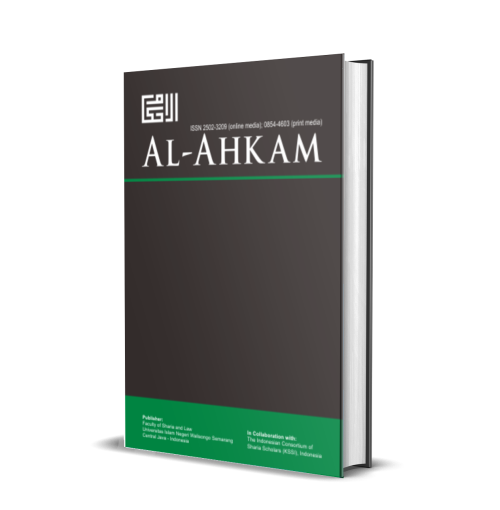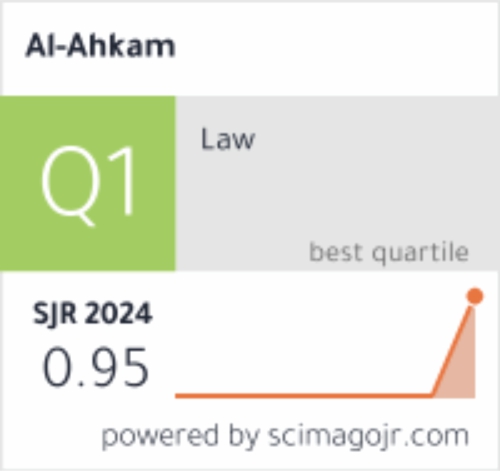Marlojong sebelum Perkawinan: Kiat Adat Menghadapi Wali ‘Aḍal di Ranah Batahan, Pasaman Barat
DOI:
https://doi.org/10.21580/ahkam.2019.29.1.3256Keywords:
marriage, guardian’s reluctant, wali ’aḍal, tradition, marlojong, khitbahAbstract
This article aims to analyze and explore the tradition of marlojong before marriage in Ranah Batahan, West Pasaman. Marlojong is the act of a couple who is not approved by their parent (wali) for certain reasons by running to the house of the elder of custom (tetua adat) or a respected family. The elopement could reduce the dignity of women and their parents. So, it becomes a reason for the traditional elders to call them. The data was collected by observation and in-depth interviews with couples who did marlojong, parents of each couple, other nuclear families, traditional elders, KUA officials and local scholars. The data was analyzed by reduction, display and verification. The results showed that the meaning of marlojong was actually not only a couple who fled to the house of the traditional elders but also the efforts to overcome the guardian's reluctance (wali ‘aḍal) and reduce the parobanan (brideprice). Therefore, the causes of marlojong were overcoming the reluctant of parents and the high level of brideprice. On one side, the marlojong was seen as negative but on the other hand, it became a customary way to resolve the guardian’s reluctance (wali ‘aḍal) without having to go to a religious court.
Downloads
References
Aji, Sution Usman. Kawin Lari dan Kawin Antar Agama. Yogyakarta: Liberty, 1989.
Benlafquih, Christine, Shareef, dan Amina. “Cultural Influences Oblige Parents to Stage Lavish Wedding even at the Risk of Facing Financial Hardships.” Islamic Horizons, 2007.
Fauzi, Ahmad. “Pemikiran Ibn Hazm tentang Keberadaan Wali Nikah dalam Perkawinan Janda.” Al-Ihkam: Jurnal Hukum dan Pranata Sosial 8, no. 2 (2014): 300–333. https://doi.org/10.19105/al-ihkam.V8I2.352.
Herliana, Baiq Rizka, Ni Wayan Arya Utami, dan Desak Putu Yuli Kurniati. “Early marriage practices and the health impacts on female adolescent health in Central Lombok: a qualitative study.” Public Health and Preventive Medicine Archive 6, no. 1 (Juli 2018): 61–67. https://doi.org/10.15562/phpma.v6i1.11.
Huzaimah, Arne. “Pandangan Hakim Pengadilan Agama Palembang terhadap Putusan Mahkamah Konstitusi Nomor 46/PUU-VIII/2010 tentang Status Anak di Luar Nikah.” Intizar 20, no. 1 (2014): 63–82.
Ismail, Abdul Fattah Wan, Hasnizam Hashim, Syahirah Abdul Shukor, dan Asma Harun. “Faraq Perkahwinan bagi Pasangan Tak Sah Taraf di Negeri Sembilan - Judicial Separation of Illegal Marriage In Negeri Sembilan.” International Journal of Islamic Thought 13, no. June (2018): 124–34. https://doi.org/10.24035/ijit.13.2018.012.
Koeswinarno, Koeswinarno, dan Mutolehudin Mustolehudin. “Islam, gay, and marginalization: a study on the religious behaviours of gays in Yogyakarta.” Indonesian Journal of Islam and Muslim Societies 7, no. 1 (Juni 2017): 125–52. https://doi.org/10.18326/ijims.v7i1.125-152.
Kudhori, Muhammad. “Hak Perempuan dalam Memilih Suami (Telaah Hadis Ijbār Wali).” Al-Ihkam: Jurnal Hukum dan Pranata Sosial 12, no. 1 (2017): 1–23. https://doi.org/10.19105/al-ihkam.v12i1.1213.
Maharaja, Nurol Huda binti Pehin Datu Seri. “Wali Nikah dalam Fiqh dan Penerapannya dalam Undang-Undang Keluarga Islam Brunei (Pindaan 2012).” Nurani: Jurnal Kajian Syari’ah dan Masyarakat 17, no. 1 (2017): 1–14.
Miles, Matthew B., dan A. Michael Huberman. Analisis Data Kualitatif. Diedit oleh Tjetjep Rohendi Rohidi. Jakarta: UI Press, 1992.
Mubarok, Nafi’. “Living Law dan ‘Urf sebagai Sumber Hukum Positif di Indonesia.” Islamica: Jurnal Studi Keislaman 11, no. 1 (September 2016): 135–58. https://doi.org/10.15642/ISLAMICA.2016.11.1.135-158.
Munir, Arshad, dan Naseem Akhter. “Marriage in Islam: An Analytical Study With a Special Focus on Non-Traditional Marriages in Pakistan.” FWU Journal of Social Sciences 12, no. 2 (2018): 179–89.
Naz, Arab, Irum Sheikh, Waseem Khan, dan Gohar Saeed. “Traditional Wedding System and Marriage by Elopement among Kalasha Tribe of District Chitral, Khyber Pakhtunkhwa, Pakistan.” FWU Journal of Social Sciences 9, no. 1 (2015): 59–69.
Nedoluzhko, Lesia, dan Victor Agadjanian. “Between Tradition and Modernity: Marriage Dynamics in Kyrgyzstan.” Demography 52, no. 3 (2015): 861–82. https://doi.org/10.1007/s13524-015-0393-2.
“Pasaman in Figure,” 2017.
Pattiroy, Ahmad, dan Idrus Salam. “Tradisi Doi’ Menre’ dalam Pernikahan Adat Bugis di Jambi.” Al-Ahwal: Jurnal Hukum Keluarga Islam 1, no. 1 (2016): 89–116.
Saladin, Bustami. “Tradisi Merari’ Suku Sasak di Lombok dalam Perspektif Hukum Islam.” Al-Ihkam: Jurnal Hukum dan Pranata Sosial 8, no. 1 (2014): 21–39. https://doi.org/10.19105/al-ihkam.V8I1.338.
Salenda, Kasjim. “Abuse of Islamic Law and Child Marriage in South-Sulawesi Indonesia.” Al-Jami’ah: Journal of Islamic Studies 54, no. 1 (Juni 2016): 95–121. https://doi.org/10.14421/ajis.2016.541.95-121.
Setiawan, Eko. “Fenomena Nikah Siri dalam Perspektif Sosiologi Hukum.” Justicia Islamica 13, no. 1 (2016): 135–55. https://doi.org/10.21154/justicia.v13i1.456.
Sudantra, I Ketut, I Made Walesa Putra, dan Yuwono Yuwono. “Aspek-aspek Hukum Keluarga dalam Awig-Awig Desa Pakraman.” Jurnal Magister Hukum Udayana (Udayana Master Law Journal) 5, no. 1 (2016): 43–58. https://doi.org/10.24843/JMHU.2016.v05.i01.p05.
Syahrial Haq, Hilman, dan Hamdi Hamdi. “Perkawinan Adat Merariq dan Tradisi Selabar di Masyarakat Suku Sasak.” Perspektif 21, no. 3 (2016): 157–67. https://doi.org/10.30742/perspektif.v21i3.598.
Tulab, Tali. “Tinjauan Status Wali dalam Perkawinan Berdasar Pendekatan Feminis.” Ulul Albab: Jurnal Studi dan Penelitian Hukum Islam 1, no. 1 (2017): 152–64. https://doi.org/10.30659/jua.v1i1.2223.
Wagianto, Ramdan. “Tradisi Kawin Colong pada Masyarakat Osing Banyuwangi Perspektif Sosiologi Hukum Islam.” Al-Ahwal: Jurnal Hukum Keluarga Islam 10, no. 1 (2017): 61–84. https://doi.org/
14421/ahwal.2017.10106.
Yakin, Ayang Utriza. “The Register of the Qadi Court ‘Kiyahi Pĕqih Najmuddin’ of the Sultanate of Banten, 1754-1756.” Studia Islamika 22, no. 3 (Januari 2016): 443–86. https://doi.org/10.15408/sdi.v22i3.2354.
Yelepele, Umar, dan Moh. Hefni. “Perkawinan Adat Muslim Suku Dani di Papua.” Al-Ihkam: Jurnal Hukum dan Pranata Sosial 7, no. 1 (2013): 17–51. https://doi.org/10.19105/al-ihkam.V7I1.317.
Downloads
Published
How to Cite
Issue
Section
License
By submitting an article to the journal, the author(s) agree to transfer the published article's copyright to the journal, which will act as the publisher. This means the journal will have the right to publish the article in various forms, including reprints. The journal will maintain the publishing rights to the published articles.
In line with the license, authors and third parties (readers, researchers, and others) are allowed to share and adapt the material. In addition, the material must be given appropriate credit, provided with a link to the license, and indicated if changes were made. If authors remix, transform or build upon the material, authors must distribute their contributions under the same license as the original.




